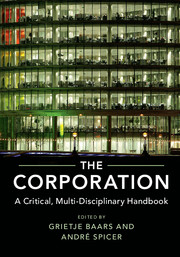Book contents
- Frontmatter
- Contents
- List of Contributors
- Acknowledgements
- Introduction: Why the Corporation?
- PART I DISCIPLINARY OVERVIEWS
- PART II INTERDISCIPLINARY THEMATIC CHAPTERS
- 1 The Evolution of the Corporate Form
- 2 The Multinational Corporate Group
- a The Multinational as a Corporate Form: A Critical Contribution from Organization Studies
- b Embedding the Multinational Corporation in Transnational Sustainability Governance
- c Banks as Global Corporations: From Entities to ‘Ecological Habitats’
- 3 The Financialization of the Corporation
- 4 Corporate Value Chains
- 5 Corporate Citizenship
- 6 The Corporation and Crime
- 7 The Corporation and Ideology
- 8 Corporation and Communities
- 9 Corporations and Resistance
- 10 Alternatives to the Corporation
- Index
- References
a - The Multinational as a Corporate Form: A Critical Contribution from Organization Studies
from 2 - The Multinational Corporate Group
Published online by Cambridge University Press: 31 March 2017
- Frontmatter
- Contents
- List of Contributors
- Acknowledgements
- Introduction: Why the Corporation?
- PART I DISCIPLINARY OVERVIEWS
- PART II INTERDISCIPLINARY THEMATIC CHAPTERS
- 1 The Evolution of the Corporate Form
- 2 The Multinational Corporate Group
- a The Multinational as a Corporate Form: A Critical Contribution from Organization Studies
- b Embedding the Multinational Corporation in Transnational Sustainability Governance
- c Banks as Global Corporations: From Entities to ‘Ecological Habitats’
- 3 The Financialization of the Corporation
- 4 Corporate Value Chains
- 5 Corporate Citizenship
- 6 The Corporation and Crime
- 7 The Corporation and Ideology
- 8 Corporation and Communities
- 9 Corporations and Resistance
- 10 Alternatives to the Corporation
- Index
- References
Summary
Introduction
In the study of international business as a specific field within management, multinationals are conceptualized as rational economic actors taking decisions about locational strategies on the basis of issues of efficiency and profitability (Rugman, 2009). In the process, they diffuse capital, technology, knowledge and skills across the world. These investments are perceived to have positive spill-over and learning effects which help draw locations into the global economy and gradually shift populations out of poverty. This perspective supports in general the principle of free trade, the removal of barriers to free trade and the development of a global structure that reinforces free trade through the World Trade Organization (WTO) and associated inter-governmental treaties. It supports the rights of multinational corporation (MNC) management to decide on firm strategy and assumes that these decisions will lead in the end to a trickle-down effect of economic and social benefits. It dismisses the actions of employees and governments to resist and reshape these policies as ineffective and counter-productive.
Critical management studies of the MNC have challenged this view from a variety of perspectives (see the discussion of the different perspectives in Collinson and Morgan, 2009). It is not unusual for critiques to simply reverse the mirror – in other words to argue that MNCs are primarily about senior management decisions but contrary to the proponents of globalization's benefits the consequences of this process are negative – the exploitation of employees and environments, the extraction of value into the hands of financial capital. In this chapter, the aim is to suggest something different from both these perspectives by emphasizing that the multinational as an organization is the site of ongoing struggles between, on the one hand, actors in the MNC headquarters, who control access to key financial resources, and on the other hand local actors in subsidiaries who exercise power over the process of production of goods and services for markets. The chapter explores this struggle which is embedded in the degree to which actors inside MNC subsidiaries are able to strategize on their own account against the demands of the MNC HQ. Is it possible for subsidiaries to resist, and what are the consequences of this resistance?
- Type
- Chapter
- Information
- The CorporationA Critical, Multi-Disciplinary Handbook, pp. 248 - 256Publisher: Cambridge University PressPrint publication year: 2017
References
- 1
- Cited by



